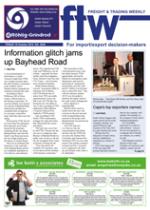The compliance implications
of a new standard
implemented by the
Zambian authorities for the
transportation of flammable
liquids is under scrutiny by
the Road Freight Association.
The RFA is currently
comparing the new standard
to South Africa’s standards
to ensure members are
compliant.
Zambian authorities
implemented the new
standard on September 1 this
year. While it has primary
reference to the transportation
of flammable liquids (and
thus affects fuel transport), it
does apply to all vehicles that
are bulk flammable liquid
tankers by design.
According to Zambian
Authorities, the decision to
implement the new measure
is based on protecting
life, property and road
infrastructure while guarding
against environmental
pollution in Zambia and was
necessitated by increased
road traffic accidents,
some of them involving
fuel tankers, both local and
foreign.
Gavin Kelly, spokesman for
the Road Freight Association,
said the association was
comparing the standard to
the SABS1518 to establish
whether tankers operated
by South African operators
(built and registered in South
Africa) were either fully
compliant with the ZS371 (the
new Zambian standard) or
whether there could be areas
where the two standards did
not complement one another.
“Looking at the document
we received, their new
standard is based on an old
South African standard that
was withdrawn some time
ago,” he said. “We are in the
process of looking at it and
seeing where the differences
in compliance are and what
our members need to do to be
compliant in Zambia.”
But, said Kelly, it was an
extremely difficult situation
as the standard was old. “This
is the standard that applied
in South Africa in 1993. It
is now 2012 so much has
changed and therefore most
of our tankers today won’t
comply with that any more
because they have moved
on. There are newer ways of
manufacturing and safety that
are now adhered to – which
this old standard does not
take into account.”
In the meantime
South African fuel tankers
being inspected in Zambia
are being forced to fork out
$190 per inspection, said
Kelly, following the
implementation of the
standard by the Zambians.
“Also there are multilateral
agreements between countries
that accept each others’
roadworthy and design
standards. Zambia is now
saying they are not doing
that and really calling for our
operators to go back in time.”
Kelly said the RFA had
therefore started a lobbying
process with CBRTA,
Fesarta and the department
of transport to enforce the
acceptance of domicilium
standards and roadworthiness
as agreed to in the various
multi- or bilateral agreements.
CAPTION
New standard applies to all vehicles that are bulk flammable liquid
tankers by design.

